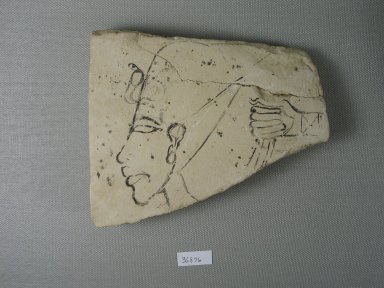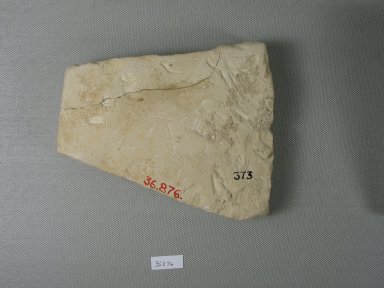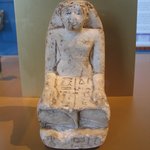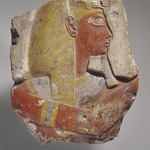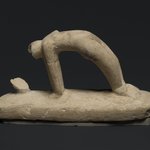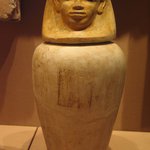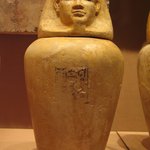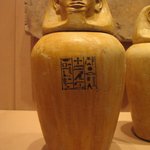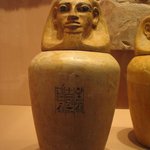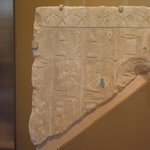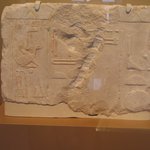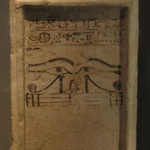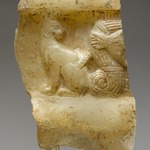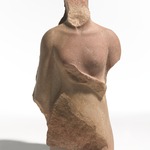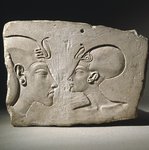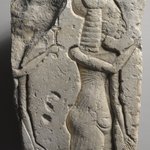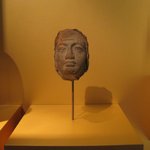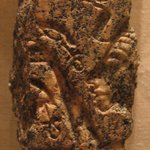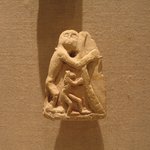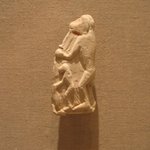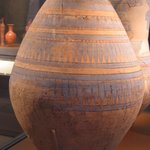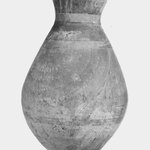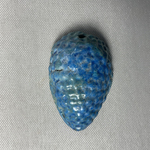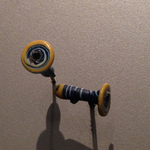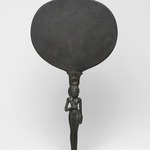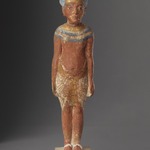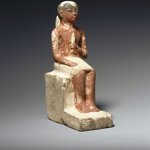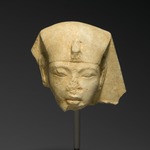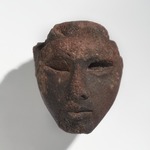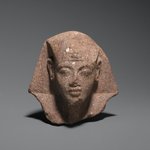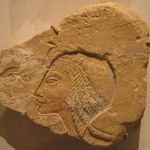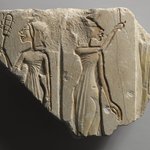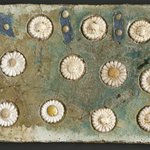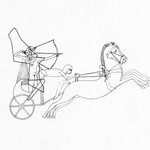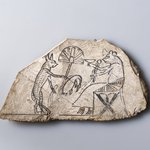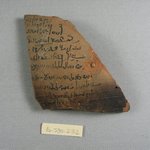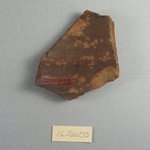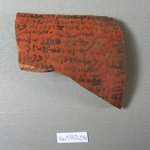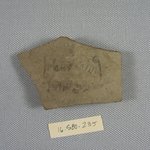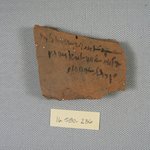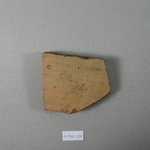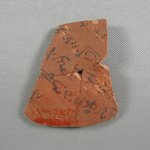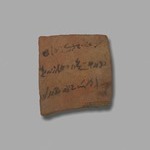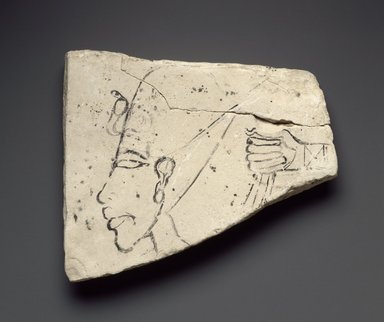

Figured Ostracon with Head of Akhenaten, ca. 1352–1336 B.C.E. Limestone, pigment, 4 11/16 x 5 5/8 x 1 in. (11.9 x 14.3 x 2.5 cm). Brooklyn Museum, Gift of the Egypt Exploration Society, 36.876. Creative Commons-BY (Photo: Brooklyn Museum, 36.876_SL3.jpg)
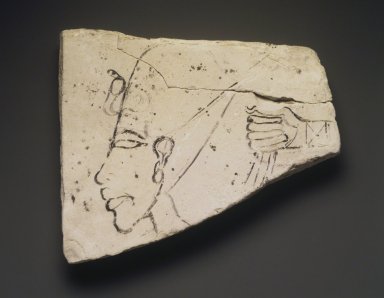
Figured Ostracon with Head of Akhenaten, ca. 1352–1336 B.C.E. Limestone, pigment, 4 11/16 x 5 5/8 x 1 in. (11.9 x 14.3 x 2.5 cm). Brooklyn Museum, Gift of the Egypt Exploration Society, 36.876. Creative Commons-BY (Photo: Brooklyn Museum, 36.876.jpg)
Figured Ostracon with Head of Akhenaten
Egyptian, Classical, Ancient Near Eastern Art
On View: Amarna Period, Martha A. and Robert S. Rubin Gallery, 3rd Floor
Art of the Amarna period is characterized by a distinctive exaggeration and elongation of facial features and limbs. Artists learning the style sketched elements of scenes as well as larger compositions on flakes of limestone or potsherds, known as ostraca. Because sketches were typically discarded soon after they were finished, artists preferred to sketch on the readily available ostraca, rather than on expensive papyrus.
The ostracon displayed here represents Akhenaten and a fist holding a horse’s reigns. Some scholars have interpreted it as a study for a scene of Akhenaten on a chariot. Others see it as a caricature, due to Akhenaten’s exaggerated features.
The ostracon displayed here represents Akhenaten and a fist holding a horse’s reigns. Some scholars have interpreted it as a study for a scene of Akhenaten on a chariot. Others see it as a caricature, due to Akhenaten’s exaggerated features.
MEDIUM
Limestone, pigment
DATES
ca. 1352–1336 B.C.E.
DYNASTY
late Dynasty 18
PERIOD
New Kingdom, Amarna Period
DIMENSIONS
4 11/16 x 5 5/8 x 1 in. (11.9 x 14.3 x 2.5 cm) (show scale)



SIGNATURE
L
COLLECTIONS
Egyptian, Classical, Ancient Near Eastern Art
ACCESSION NUMBER
36.876
CREDIT LINE
Gift of the Egypt Exploration Society
CATALOGUE DESCRIPTION
Limestone trial piece with ink sketch of the head of Akhenaten and to the right a clenched hand. The king wears the elongated crown with royal uraeus. His features include the usual long skull, very full lips and receding forehead. .
Condition: A large fragment has been glued in place at the top of the piece. A small chip is missing at the thumb. The upper part of the drawing of the crown is very faint.
MUSEUM LOCATION
This item is on view in Amarna Period, Martha A. and Robert S. Rubin Gallery, 3rd Floor
CAPTION
Figured Ostracon with Head of Akhenaten, ca. 1352–1336 B.C.E. Limestone, pigment, 4 11/16 x 5 5/8 x 1 in. (11.9 x 14.3 x 2.5 cm). Brooklyn Museum, Gift of the Egypt Exploration Society, 36.876. Creative Commons-BY (Photo: Brooklyn Museum, 36.876_SL3.jpg)
IMAGE
overall, 36.876_SL3.jpg. Brooklyn Museum photograph
"CUR" at the beginning of an image file name means that the image was created by a curatorial staff member. These study images may be digital point-and-shoot photographs, when we don\'t yet have high-quality studio photography, or they may be scans of older negatives, slides, or photographic prints, providing historical documentation of the object.
RIGHTS STATEMENT
Creative Commons-BY
You may download and use Brooklyn Museum images of this three-dimensional work in accordance with a Creative Commons license. Fair use, as understood under the United States Copyright Act, may also apply.
Please include caption information from this page and credit the Brooklyn Museum. If you need a high resolution file, please fill out our online application form (charges apply).
For further information about copyright, we recommend resources at the United States Library of Congress, Cornell University, Copyright and Cultural Institutions: Guidelines for U.S. Libraries, Archives, and Museums, and Copyright Watch.
For more information about the Museum's rights project, including how rights types are assigned, please see our blog posts on copyright.
If you have any information regarding this work and rights to it, please contact copyright@brooklynmuseum.org.
RECORD COMPLETENESS
Not every record you will find here is complete. More information is available for some works than for others, and some entries have been updated more recently. Records are frequently reviewed and revised, and we welcome any additional information you might have.
